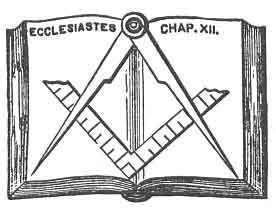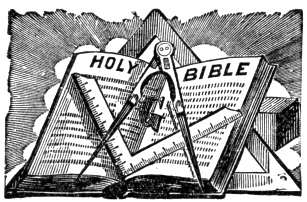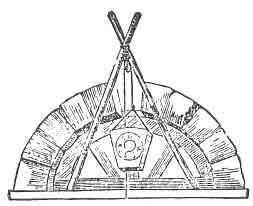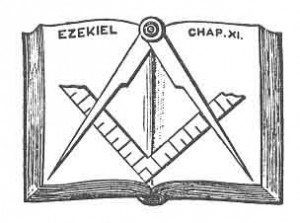p. 77
of Hiram’s death, and work accordingly in their lodges. Others say the sign was given and the exclamation made at the grave, when Solomon went to raise Hiram, and, of course, they work accordingly; that is to say, the Master who governs the lodge, holding the latter opinion, gives the sign, etc., at the grave, when he goes to raise the body, and vice versa.
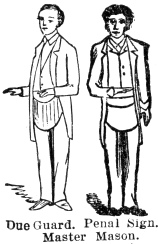 |
The Due Guard is made by holding both hands in front, palms down, as shown in cut, and alludes to the manlier of holding the hands while taking the obligation of Master Mason.
The Penal Sign is given by putting the right hand to the left side of the bowels, the hand open, with the thumb next to the belly, and drawing it across the belly, and letting it fall; this is done tolerably quick. This alludes to the penalty of the obligation: “Having my body severed in twain,” etc. See page 75. After the Master has given the sign and due guard, which does not take more than a minute. he says, “Brother, I now present you with my right hand, in token of brotherly love and affection, and with it the pass-grip and word.”
 |
The pass-grip is given by pressing the thumb between the joints of the second and third fingers where they join the hand; the word or name is Tubal Cain. It is the pass-word to the Master’s degree. The Master, after giving the candidate the pass-grip and word, bids him rise and salute the Junior and Senior Wardens, and convince them that he is an obligated Master Mason, and is in possession of the pass-grip and word. While the Wardens are examining the candidate, the Master returns to the east and gets an apron, and, as he returns to the candidate, one of the Wardens (sometimes both) says to the Master, “Worshipful. we are satisfied that Bro. —— is an obligated Master Mason.” The Master then says to the candidate, “Brother, I now have the honor to present you with a lamb-skin or white apron, as before, which I hope you will continue to wear, with credit to yourself and satisfaction and advantage to the brethren; you will please carry it to the Senior Warden in the west, who will teach you how to wear it as a Master Mason.
The Senior Warden ties on the apron and lets the flaps
p. 78
fall down before, in its natural and common situation.
The Master returns to the seat and the candidate is con. ducted to him. Master to candidate, “Brother, I perceive you are dressed, it is of course necessary you should have tools to work with. I will now present you with the working tools of the Master Mason, and explain their use to you. The working tools of a Master Mason are all the implements of Masonry indiscriminately, but more especially the trowel. The trowel is an instrument made use of by operative masons to spread the cement which unites a building into one mass, but we, as Free and Accepted Masons, are taught to make use of it for the more noble and glorious purpose of spreading the cement of brotherly love and affection; that cement which unites us into one sacred band or society of friends and brothers, among whom no contention should ever exist but that noble contention, or, rather, emulation, of who can best work or best agree. I also present you with three precious jewels; their names are Humanity, Friendship, and Brotherly Love.
Brother, you are not invested with all the secrets of this degree, nor do I know whether you ever will be until I know how you withstand the amazing trials and dangers that await you.
You are now about to travel, to give us a specimen of your fortitude, perseverance, and fidelity in the preservation of what you have already received. Fare you well, and may the Lord be with you and support you through all your trials and difficulties.” [In some lodges they make him pray before he starts.] The candidate is then conducted out of the lodge, clothed, and returns; as he enters the door his conductor says to him, “Brother, we are now in a place representing the sanctum sanctorum, or holy of holies, of King Solomon’s temple. It was the custom of our Grand Master, Hiram Abiff, every day at high twelve, when the Crafts were from labor to refreshment, to enter into the sanctum sanctorum, and offer up his devotions to the ever living God. Let us, in imitation of him, kneel and pray.” They then kneel and the conductor says the following prayer:

Moe is the founder of GnosticWarrior.com. He is a father, husband, author, martial arts black belt, and an expert in Gnosticism, the occult, and esotericism.

